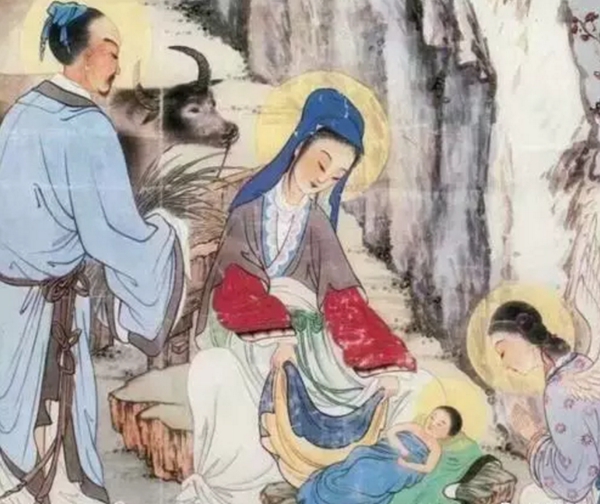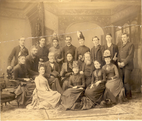Chinese painting has a long history and many great painters have emerged. In the early years of the Qing Dynasty, six painters became famous for their landscape paintings, known as the "Six Artists of the Early Qing Dynasty": Wang Shimin, Wang Jian, Wang Ji, Wang Yuanqi, Wu Li, and Yun Shouping. In the history of Chinese art, they are regarded as the painting leaders after Dong Qichang.
Among these six, Wu Li's identity and experience are quite legendary. The history of Chinese art is full of religious figures involved in painting and calligraphy, as exemplified by the Tang Dynasty monk Huai Su. Wu, however, was a Catholic priest, a rare figure in the history of Chinese art.
Wu Li was born in 1631 or 1632 as a native of Changshu, Jiangsu Province. His ancestors had been officials in the Ming Dynasty, but by his generation, that dynasty had fallen into decline. He lived a hard life as a teenager but tried hard to study, hoping to make something of himself. However, in 1644, the Qing army invaded Shanhaiguan, which made the young Wu Li very disappointed and discouraged his idea of joining the imperial examinations to become an official.
Nevertheless, his will to learn did not change, according to the book "Wu Yushan Chronology" by the famous historian Chen Yuan, Wu Li "learned Confucianism from Chen Hu and poetry from Qian Qianyi at the age of about 20, and looked at the collection of paintings of Wang Shimin and Tang Yuzhao throughout his 30s; he traveled to the capital at the age of 40."
Although Wu Li was only an ordinary man, his desire to learn allowed him to roam around the cultural circles of China at the time and started his career as a painter.
The famous paintings he created, such as "A Sunny View of Hengshan", "The Spring Scenery of the Lake", "Early Snow", "Pipaxing", "Wandering in Forest under Autumn Moon", "Evening Bell of Autumn Temple", " The Mountain Village" and "Imitation of Pine and Snow Immortal Residence", have become heirlooms and precious collections by the National Palace Museum, Shanghai Museum and so on.
Wu's paintings were widely praised in the Qing Dynasty. Wang Shigu, who was also one of the six artists of the early Qing Dynasty, pointed out that "his paintings were at the peak of the Song and Yuan dynasties".
Wu lived at a time when the Jesuits were entering China when Western learning was being introduced to the East and middle school was being spread to the West. He had many dealings with the western missionaries of that time and soon accepted the Christian faith, taking the religious name Simon. In 1681, the Belgian priest Berkeley planned to return to Rome to report to the Pope on his religious affairs, wanting to bring along Chinese believers to let them see the world. Wu Li was curious about the distant and exotic world and therefore decided to go.
Unfortunately, when he arrived in Macau, he suddenly fell ill and was unable to travel to Europe. It may be that his suffering inspired his passion for faith. He decided to join the Jesuits and made a vow of poverty, chastity, and obedience to become a monk.
He then entered St. Paul's College to further his studies in theology, philosophy, etc. During this time, he absorbed the Western art of painting and further improved his painting skills. At the same time, while in Macau, he also composed the Samba Collection.
He became a "priest painter" in 1688 when the first Chinese Catholic bishop, Luo Wenzao, consecrated three Chinese priests, including Wu Li. In his later years, Wu Li pastored the Church in Jiangsu and contributed to the spread of the Gospel until 1718, when he rested in peace in Shanghai.
Hymn 386 in the "New Hymnal" currently in use in the Chinese Church was composed by Wu Li.
Below are the lyrics of "Hymn of Praise":
God had a plan of salvation before he created the heavens and the earth;
the will to judge the world is high in the heavens and points to the end times.
There was a man whose blood flowed like water and who suffered from injuries in all internal organs;
the wonders of the cross are poured out in the hearts of all nations.
The way to heaven is free and easy
while the devil's schemes lead people astray;
My mission is to follow Jesus, to worship Him, and follow Him step by step.
- Translated by Wylie Sun












